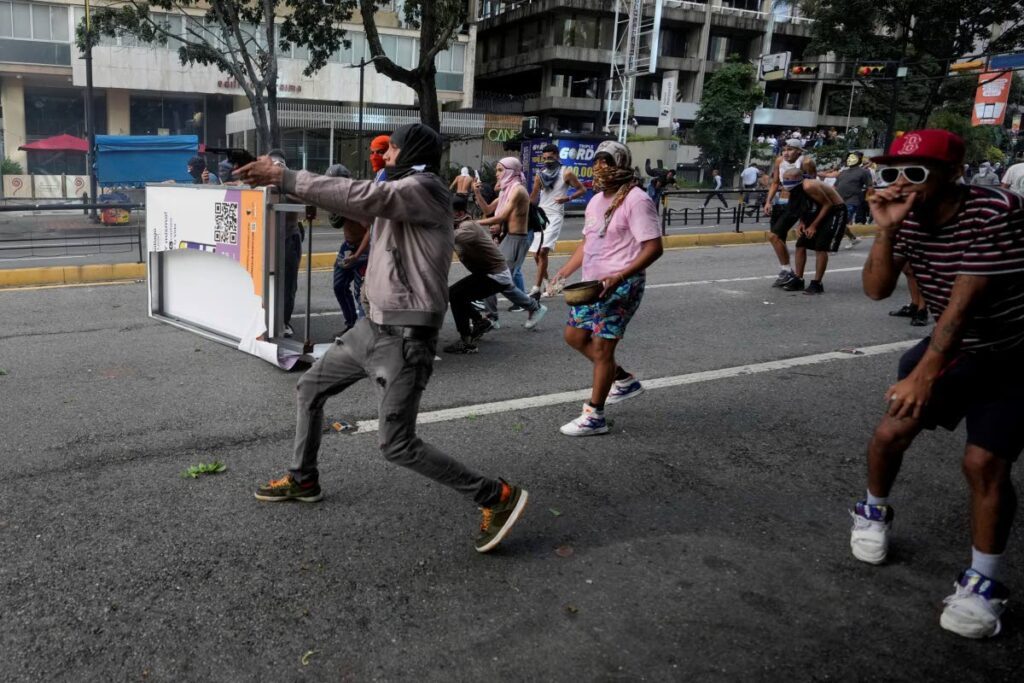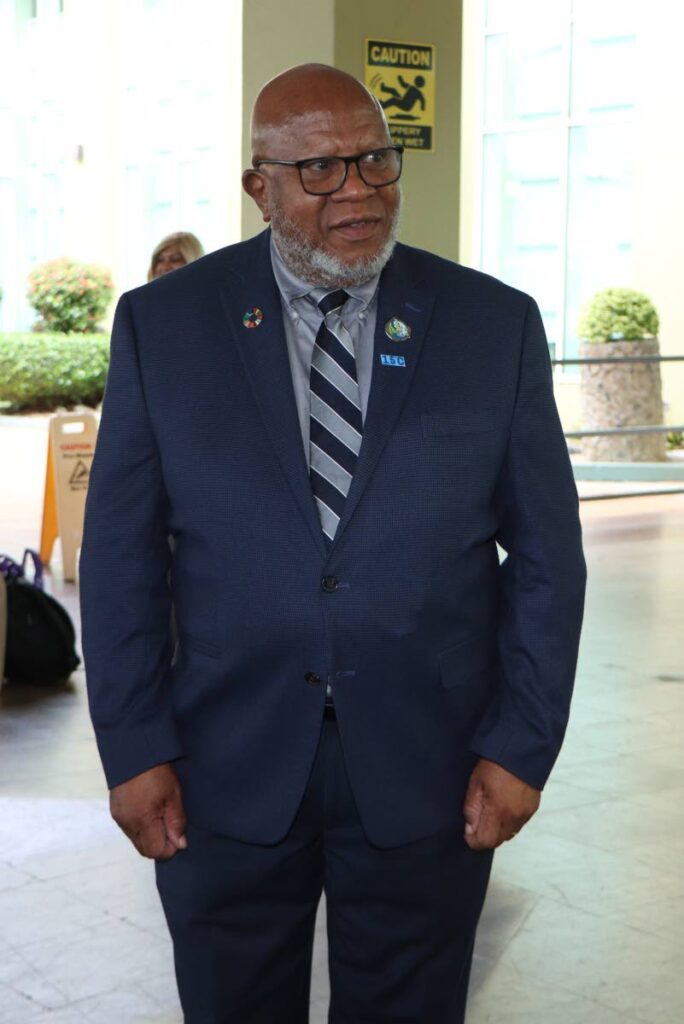General Assembly president: UN can help in Venezuela crisis

AMBASSADOR Dennis Francis, president of the UN General Assembly, expressed his concern at the current conflict in Venezuela but believes the UN could play in a role towards resolution.
He spoke to reporters on August 4 on landing at Piarco Airport for a four-day official visit.
Asked how it was to be back, he said, "It is always a pleasure coming home. And it is a particular pleasure on this occasion."
He said he had six weeks remaining in his term, heading the 78th session of the UN general assembly.
He did not want to judge his own tenure when asked how he had done, saying that question was best answered by others.
"I can't assess myself. I mean I can, but I shouldn't. Of course everyone wants to succeed, so that question is best posed to others.
"To the extent that the work is being done and has been done, it has been uneventful. Uneventful in the sense that nothing disruptive (has happened) to undermine the performance of the office of the president of the General Assembly. So to that extent it has been without accident."
Newsday asked if he had any hopes for the situation in Venezuela.
"In diplomacy there is always (hope). That is what diplomacy is. Dialogue. When people sit down and talk you can never predict a priori (from beforehand) where the discussion will go.
"At the UN, hope is always something that is in our consciousness, because conflicts can be resolved, through dialogue. We have seen that over and over again. And the hope is that dialogue will take place."
Newsday asked if there might be a role for the UN to try to facilitate dialogue to resolve the Venezuela crisis.
He replied, "Absolutely. That is part of the mandate of the UN. Where there is conflict, to assist and support, sometimes to provide good offices, sometimes to provide mediation, but to get the parties together, around the tables so they can confront the issues openly and frankly and come to some common understanding as to how they can be resolved.
"Anything that does that, that promotes peace, is what the UN does and will support."
Newsday asked if the UN was considering any time line to get the parties sitting down and talking, given the daily disturbances now happening at ground level in Venezuela.
Francis said, "There is never per se a time line because every conflict is different.

"Sometimes what is possible in one domain is not possible in others. So it is not the timeline. It is the moment. It is recognising the moment when it would be appropriate for that dialogue to take place. Of course the dialogue will not happen unless all parties to the conflict – both parties – agree."
Newsday asked if the current situation in Venezuela was of concern.
"Any electoral situation that results in uncertainty, in doubt, in claims of impropriety, and of fraud, is a matter of concern, because the UN strongly promotes and supports the principle of democracy. It is the will of the people that must always prevail."
"I cannot say this situation in Venezuela is without concern. It has not yet come frontally to the table of the UN as yet."
The pro-Maduro National Electoral Council (CNE) gave President Nicolas Maduro victory with 51 per cent of the vote, ahead of 44 per cent for his main rival Edmundo González, but the Venezuelan Opposition said González won with 70 per cent of votes. Since the results were announced, protests have taken place, which armed police have tried to suppress.
Maduro has received statements of support from China, Russia, Iran, Cuba, Honduras, Nicaragua, Bolivia and St Vincent and the Grenadines, while US President Joe Biden, Brazil President Lula de Silva, the European Union (EU), and the Organisation of American States (OAS) called for the presentation of voting data, if any, to back up the results.
However, Caricom chairman Dickon Mitchell said Venezuelans got the opportunity to exercise their democratic right to engage in elections.
"Elections are held everywhere. Sometimes they are disputed, sometimes they are not, and, respectfully, it is not Caricom's position to come out and say that there ought to be a verification of any country's election."
An OAS statement on August 2 called for a commission to verify the results.
"The General Secretariat of the Organization of American States (OAS) expresses its solidarity with the victims of repression in Venezuela and their families and demanded an end to violence and the imprisonment of protesters by the government, while reiterating the need to verify the voting records of the Venezuelan electoral process of July 28, 2024."
Chile President Gabriel Boric said, "The results are hard to believe." Uruguay President Luis Lacalle Pou said it was "an open secret" Maduro would win whatever the results. Costa Rica, El Salvador and Peru dubbed the results "fraudulent."
Ecuador President Daniel Noboa lamented "the dangers of dictatorship" and "politicians who cling to power."
Argentine President Javier Milei said, "Not even (Maduro) believes the electoral scam he is celebrating."
However, Cuban President Miguel Diaz-Canel said, "Nicolas Maduro, my brother, your victory, which is that of the Bolivarian and Chavista people, has cleanly and unequivocally defeated the pro-imperialist opposition. They also defeated the regional, interventionist and Monroist right. The people spoke and the revolution won."
The Carter Center said the election did not meet international standards of electoral integrity and could not be considered democratic.
"The Carter Center cannot verify or corroborate the results of the election declared by the National Electoral Council (CNE), and the electoral authority’s failure to announce disaggregated results by polling station constitutes a serious breach of electoral principles.
"Venezuela's electoral process did not meet international standards of electoral integrity at any of its stages and violated numerous provisions of its own national laws. The election took place in an environment of restricted freedoms for political actors, civil society organizations, and the media."
The US State Department said the CNE’s failure to provide the precinct-level official results, as well as irregularities throughout the process, have stripped the CNE’s announced outcome of any credibility.
"Meanwhile, the democratic opposition has published more than 80 percent of the tally sheets received directly from polling stations throughout Venezuela. Those tally sheets indicate that Edmundo González Urrutia received the most votes in this election by an insurmountable margin."
The pro-Maduro news channel Telesur. however ,promised, "On Saturday, the president of the National Assembly, Jorge Rodriguez, will present his compatriots with more evidence of the fraud that the Venezuelan far-right intends to carry out.
"This socialist legislator will publicly expose the mutilated and forged records through which the US-backed opposition seeks to artificially create the electoral victory of Edmundo Gonzalez, a politician supported by Maria Corina Machado, the leader of the far-right organization Vente Venezuela."

Comments
"General Assembly president: UN can help in Venezuela crisis"